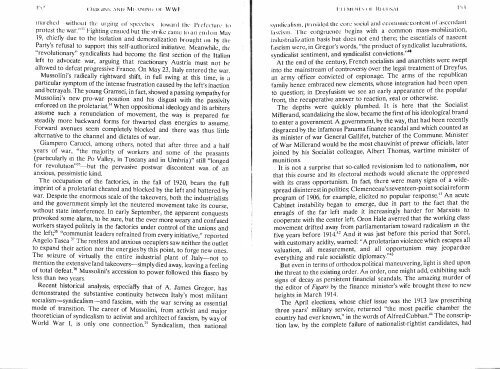CONTENTS - ouroboros ponderosa
CONTENTS - ouroboros ponderosa
CONTENTS - ouroboros ponderosa
Create successful ePaper yourself
Turn your PDF publications into a flip-book with our unique Google optimized e-Paper software.
()I,l< ilNS .\ NII r'vl l',\ NIN( ; 1)1 W\VI<br />
illal"Chl;d ··without the urging of spen:ill's toward lill' Prckclul"l' 1(1<br />
rrotet the war.",H I,'ighting enslied but till; sO'ike canw to an end on Mav<br />
19, c?ictly due to the isolation and demoralization hrought on hy til;'<br />
Party s retusal to support th,s self-authorized initiative. Meanwhile (he<br />
"revolutionary" syndicalists had become the first section of the 1tlia"<br />
left to advocate war, arguing that reactionary Austria must not he<br />
allowed to defeat progressive France. On May 23, Italy entered the war.<br />
Mussolini's radically rightward shift, in full swing at this time, is a<br />
partIcular symptom of the intense frustration caused by the left's inaction<br />
and bctray,als. The young Grams?i, in fact, showed a passing sympathy for<br />
Mussoh", s new pro-war pOSItIOn and hIS dIsgust WIth the passivity<br />
enforced on (he proletariat." When oppositional ideology and its arbiters<br />
asslJe such a renunciation of movement, the way is prepared for<br />
steadIly more backward forms for thwarted class energies to assume.<br />
Forward avenues seem completely blocked and there was thus little<br />
altcrnatlve to the channel and dictates of war.<br />
Giampero Carocci, among others, noted that after three and a half<br />
years of war, "the majority of workers and some of the peasants<br />
(parncularly on ,, :e Po Valley, in Tscany and in l!mbria)" still "longed<br />
for revolutoon -but thc pervasIVe pOSTwar d,scontent was of an<br />
anxious, pessimistic kind.<br />
The occupation of the factories, in the fall of 1920 bears the full<br />
imprint of a proletariat cheated and blocked by the left nd battered by<br />
war. DespIte the enormous scale of the takeovers, both thc industrialists<br />
and the government simply let the neutered movement take its course<br />
provoked some alarm, to be sure, but the ever more weary and confused<br />
WIthout state interference. In early September, the apparent conquest;<br />
workers stayed politely in the factories under control of the unions and<br />
the left;" "communist leaders refrained from every initiative," reported<br />
Angelo Tasca ," The restless and anxious occupiers saw neither the outlet<br />
to expad their action nor the energies by this point, to forge new ones.<br />
The seIzure of virtually the entire industrial plant of Italy-not to<br />
mentIon the extensIVe land takeovers-simply died away, leaving a feeling<br />
of total defeat." Mussolini's accession to power followed this fiasco by<br />
less than TwO years.<br />
Recent historical analysis, especially that of A. James Gregor, has<br />
demonstrated the substantive continuity between italy's most militant<br />
soclaiosm-syndicalism-and fascism, with the war serving as essential<br />
theoretIcIan of syndlcaiosm to achvlst and architect of fascism, by way of<br />
mode of tranSItIon . . The career of Mussolini, from activist and major<br />
World War I, IS only one connection." Syndicalism, then national<br />
I ',I I r-..l1 N I'; ( ,1, I{I'I'I ISAI<br />
sYlldk;dism. provided tht.; con: social and CLlHlomic content of accIlant<br />
.<br />
fascism. The congruence hegins with a common mass-mobilization,<br />
ill(lustriali/.ation basis but docs not end there; the essentials of nascent<br />
fascism were, in Gregor's words, "the product of syndicalist lucubrations,<br />
syndicalist sentiment, and syndicalist convictions."'"<br />
into the mainstream of controversy over the legal treatment of Dreyfus,<br />
At the end of the century, French socialists and anarchists werc swept<br />
an army officer convicted of espionage. Thc arms of the republican<br />
family hence embraced new clements, whose integration had been open<br />
(a question; in Dreyfusism we see an early appearance of the popular<br />
front, the recuperative answer to reaction, real or otherwise. . '<br />
The depths were quickly plumbed. It is here that the . Soclahst<br />
Millerand, scandalizing the slow, becamc the first of his ideologIcal brand<br />
to enter a government. A government, by the way, that had been recently<br />
disgraced hy the infamous Panama finance scandal and which counted as<br />
its minister of war General Gallifet, butcher of the Commune. Mmlster<br />
of War Millcrand would be the most chauvinist of prewar officials, later<br />
joined by his Socialist colleague, Albert Thomas, wartime minister of<br />
munitions.<br />
It is not a surprise that so-called revisionism led to nationalism, nor<br />
that this course and its electoral methods would alienate the oppressed<br />
with its crass opportunism. In fact, thcre were many signs of a wide<br />
spread disinterest in politics; C1emeneeau'sseventeen-point social reform<br />
program of 1906, for example, elicited no popular response.'] An acutc<br />
Cabinet instability began to emerge, due in part to the fact that the<br />
enrages of the far left made it increasingly harder for MafX1sts to<br />
cooperate with the center left. Oron Hale averred that the workmg class<br />
five years before 1914.42 And it was just before this period that Sorci,<br />
movement drifted away from parliamentarism toward radlcahsm m the<br />
with customary acidity, warned: "A proletarian violence whIch escapes all<br />
valuation, all measurcment, and all opportunism may jeopardIze<br />
everything and rule socialistic diplomacy.""<br />
But even in terms of orthodox political maneuvering, light is shed upon<br />
the threat to the existing order. An order, one might add, exhibiting such<br />
signs of decay as persistent financial scandals. The amazing murder of<br />
the editor of Figaro by the finance minister's wife brought these to new<br />
heights in March 1914.<br />
The April elections, whose chief issue was the 1913 law prescnblOg<br />
three years' military service, returncd "the mosl pacific chamber the<br />
country had ever known," in the words of Alfred Cobban." The conscrip<br />
lion law, by the complete failure of nationalist-rightist candidates, had<br />
. .






